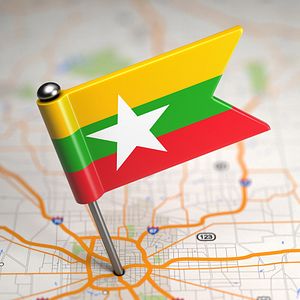On Thursday, Myanmar’s parliament met to put forward presidential candidates four months after opposition leader Aung San Suu Kyi’s National League for Democracy (NLD) swept historic elections in the country (See: “Myanmar’s Opposition Clinches Majority in Historic Eelction Win“).
Under Myanmar’s complicated selection process, the country’s next president is chosen from among three vice-presidents elected by its parliament or Pyidaungsu Hluttaw, with one candidate from the lower house (Pyithu Hluttaw), one from the upper house (Amyotha Hluttaw) and one from the military which still holds 25 percent of seats. The president is selected from among the three at a joint sitting of parliament, with the other two remaining vice-presidents and part of the new government which will take power at the end of March.
Despite her status as Myanmar’s democracy icon, the 70-year old Suu Kyi is herself is ineligible for the position because of a clause in the constitution that prevents those with close foreign ties from being president (her late husband and two sons are British). With Suu Kyi insisting that she would nonetheless remain “above the presidency,” the discussion over the past few months has shifted to who she might tap from within the NLD to serve as an effective proxy president, with her still wielding considerable power in practice.
Yesterday, the speculation officially ended when the NLD nominated Htin Kyaw for vice president in the lower house and Henry Ban Tri U, a party official from Chin state, in the upper house. The outgoing ruling party, the Union Solidarity and Development Party (USDP), nominated Sai Mauk Kham, a current vice president, in the lower house, and Khun Aung Myint, a former chairman of the upper house, in the upper house. The military is yet to nominate its candidates and is expected to do so next week.
With the NLD’s clear majority in both houses, sources say that Htin Kyaw, Suu Kyi’s close confidante, is the NLD’s top choice to assume the presidency and is all but certain to do so. Htin Kyaw, the son-in-law of one of the party’s founders and the son of a renowned poet, is now part of Suu Kyi’s charitable foundation and previously served as her driver. He initially graduated from the Yangon Institute of Economics and then went on to Oxford University, where Suu Kyi also pursued her studies.
Meanwhile, it is still unclear what Suu Kyi’s role will be in the new NLD-led government. Some sources say she is most likely to assume a role akin to Singapore’s late founding father Lee Kuan Yew, who initially served as senior minister following his retirement from the premiership. In that capacity, she would play a leading role in directing policy.
Another alternative considered was foreign minister, the only civilian minister post in the powerful, 11-member National Defense and Security Council which brings together the military and the government and oversees policy. In this case, she would have a direct vote in the Council – it currently favors the military which would have six members as opposed to five NLD representatives – instead of only influencing the president and attending meetings. She may also choose not to take an official position at all and remain head of the NLD while continuing to play influential role in key issues like the peace process as well as reforming bodies such as the Council to make it less favorable to the military.
































